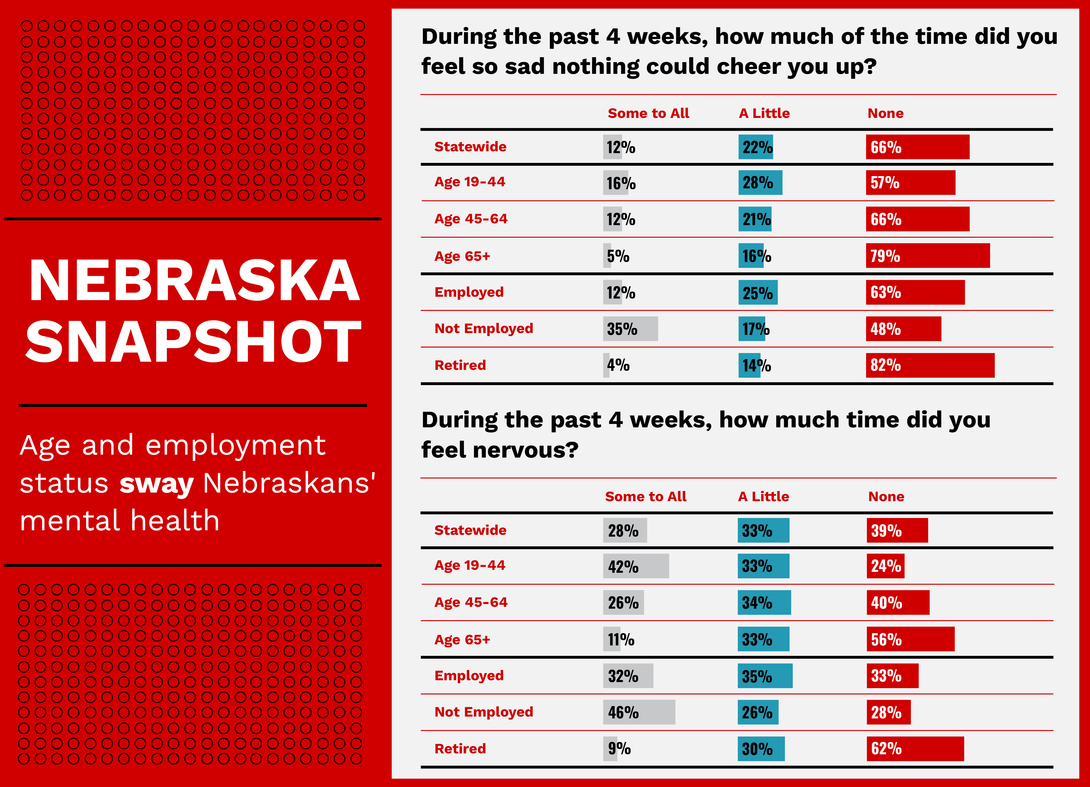Nebraskans are mostly happy, but data from the University of Nebraska–Lincoln suggests younger residents and the unemployed are struggling more with sadness and nervousness.
In the latest Nebraska Snapshot from the Bureau of Sociological Research, 66% of Nebraskans surveyed said they had no periods of sadness in the previous four weeks, while 22% reported spending a little time feeling sad and 12% reported they had spent some to all of the previous four weeks feeling sad.
“We looked at all of the mental health indicators on NASIS, and it was surprising that how often people felt sad, hopeless and worthless were correlated — the distribution patterns were pretty similar across all four variables and across all the demographic breakdowns in the snapshot,” said Amanda Ganshert, assistant director for research and methods at BOSR. “Therefore, we just picked one — sadness — to display in the snapshot.”
The Nebraska Snapshot, released bi-monthly, is produced from a series of questions included in the Nebraska Annual Social Indicators Survey, which is deployed each fall. It includes responses from approximately 1,660 Nebraska residents.
Among the groups most likely to report feeling the most sadness were the unemployed, of which 35% reported they had spent some to all of the time sad, and residents aged 19-44, of which 16% reported feeling sad some to all of the time. Only 4% of those retired reported feeling sad some to all of the time.
Older Nebraskans experience much less sadness than their younger counterparts. A large majority — 79% — of those 65 and older said they had no periods of sadness, while only 57% of those aged 19-44 and 66% of those aged 45-64 reported the same. Additionally, 82% of retired residents reported no periods of sadness, in contrast to only 63% of employed Nebraskans and 48% of unemployed Nebraskans.
When asked, “during the past four weeks, how much of the time did you feel nervous?” again, age and employment status demographics highlighted the biggest shifts. Overall, 39% reported none, 33% reported a little of the time and 28% reported some to all of the time.
Those retired and 65 and older reported the least amount of nervousness, with 62% and 56%, respectively, reporting none, while those aged 19-44, with 42% and 46%, respectively, reported feeling nervous some to all of the time.
Feelings of nervousness were similar among residents who lived in a town or city, on a farm or in open country, though. Only 37% of residents living on a farm reported not feeling nervous, along with 38% in a city or town, and 44% living in open country. On the other hand, 31% of those on farms, 29% of those living in a town or city, and 20% of those living in open country reported being nervous some to all of the time.
“It is surprising that those who live in a town or city are nervous about as often as those living on a farm,” Ganshert said. “Nebraska researchers will need to talk with farmers to determine why this is.”
NASIS is used by researchers, state entities and policymakers, but also includes a core questionnaire that delves into demographics, quality of life measures, educational attainment and community satisfaction, among other variables. These core questions will inform most of the Nebraska Snapshot series. Previous topics covered by Nebraska Snapshots included internet access, finances and how Nebraskans feel about the direction of their state.
All Nebraska Snapshots are available online. To include research questions on the next NASIS administration, email bosr@unl.edu.














